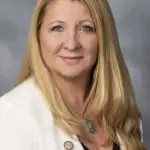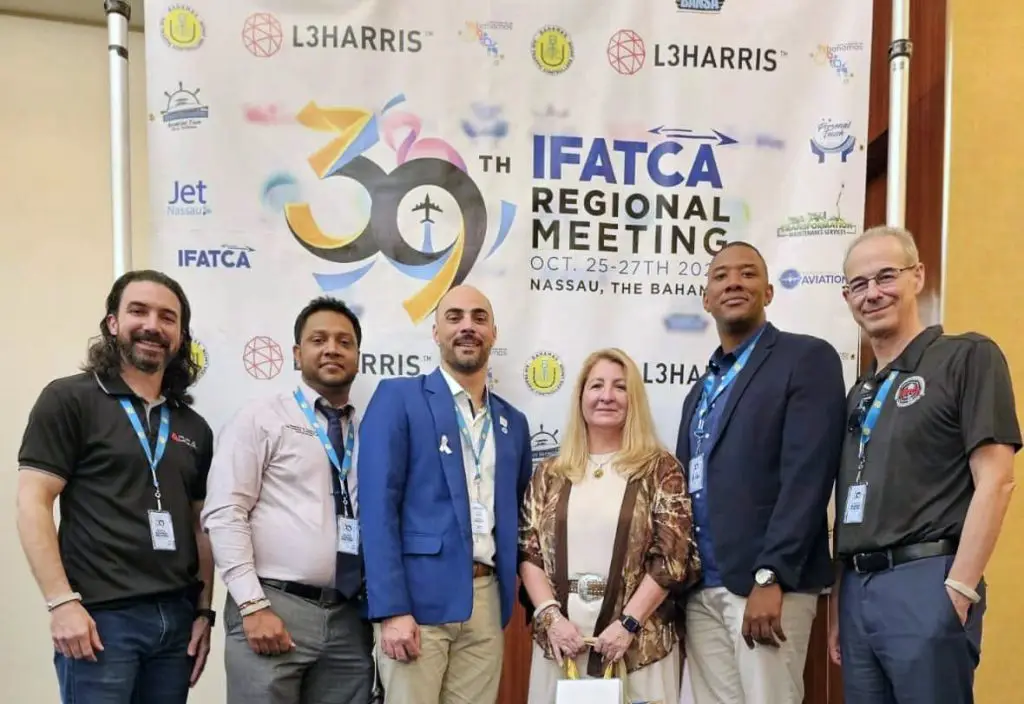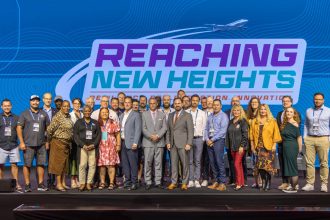
by Trish Gilbert
IFATCA Executive Vice President AmericasThank you to the America’s Region Member Associations (MA), the presenters, our Sponsors, and our host association – the Bahamas Air Traffic Controllers’ Union (BATCU) – who, with love and passion, proudly organized an exceptional meeting.
The amazing women and men of BATCU hosted over 50 attendees from 13 countries for the 39th IFATCA Americas regional meeting from 25 to 27 October in Nassau, Bahamas. The Bahamas, renowned for its beauty and the warmth of its people, celebrates its 50 years of independence this year. The Americas region directors from Canada, Chile, Dominican Republic, Jamaica, Grenada, Guyana, Mexico, Panama, Trinidad & Tobago, Turks & Caicos, the United States and Uruguay were pleased to join them to honour this momentous milestone.
The Bahamas Ministry of Tourism, Investments, and Aviation hosted an amazing opening dinner at the Balmoral Club. The next morning, distinguished guests welcomed directors at the opening ceremony. Welcome remarks were given by Mr Hinsey McKenzie, President of BATCU; Ms Trish Gilbert, IFATCA EVP Americas; Mr Lenn King, Director of Bahamas Air Navigation Services Authority (BANSA); Dr Kenneth Romer, Director of Aviation & Deputy Director General of Tourism; and the Honorable I. Chester Cooper, M.P. Deputy Prime Minister of the Commonwealth of the Bahamas & Minister of Tourism, Investments and Aviation. The ceremonies closed with a fabulous Junkanoo dance parade. Junkanoo is a celebration that showcases the culture and traditions of the islands.
During the regional meeting, we learned from regional subject matter experts on Crisis Management, Critical Incident Stress Management programs and trends in addressing mental health for ATCOs. We received updates from the IFATCA EVP Technical and the TOC chair, the Communications Committee and the IFATCA 2030+ and Equity, Diversity, and Inclusion Task Forces. Two of the region’s vice presidents briefed attendees on the IFATCA Speak English Program and a recent presentation to the ILO on “Regulating for Decent Work”. We were once again honoured to have Emiliano Addisi from the International Transport Workers Federation join us and present their very important work. Finally, one of our sponsors, L3Harris, presented on ATC and their incredible support work.
After the opening ceremonies, day one of the meeting started with Tom Flanary (U.S. and NATCA Disaster Response Committee Chair), Lorenzo Carroll (Bahamas) and Ameer Chattergoon (T&T and RVP, Southern Caribbean) on a panel discussing Crisis Management – Changing the Way We Respond to Disasters and Emergencies. Tom began with the evolution of NATCA’s Disaster Response Committee (DRC). Shifting from a reactive to a preparedness stance. The outcome was for the panel and the region to better prepare for emergencies, disasters, and crises, whether it is floods, fire, earthquakes, volcanic ash, a nuclear event, armed conflict, security threats, airborne spread of diseases/pandemics, a major failure of ATM system, a cyber-attack, shortage of fuel or threats from space (space debris, space weather).

The day then provided the region’s attendees with information on setting up a Critical Incident Stress Management (CISM) Program to support air traffic controllers in their countries in the event of an aviation accident, incident, or other traumatic episode. Sarah Grampp (U.S. NATCA CISM Lead) & Ramon Armora (Dominican Republic and RVP Northern Caribbean) further expounded and detailed the recent peer debriefers training and certification in the Dominican Republic.
We closed the day on the importance of Current Trends in Addressing Mental Health for ATCOs presented by Andrew LeBovidge (NATCA U.S. EVP). Recently, Andrew represented IFATCA at the ICAO Air Navigation World 2023 on Today’s Mental Health panel discussion. The session was on balancing personal health and aviation safety with a specific focus on the role of building trust, training, and peer support initiatives. There is a lot more willingness from the society at large to talk about and address mental health and well-being, especially since the pandemic. The conversation on this subject was robust, with many wanting to see IFATCA do more in this area.
Day two kicked off with a brief review of the IFATCA 2030+ work from this year’s conference: agility, community, and conferences. Jaymi Steinberg (NATCA U.S) and Kendell Peter (St. Lucia) represent the AMA region on the task force. The group was formed in 2021 and was developed to gather information from IFATCA member associations on where they want to see the Federation in the short, mid, and long term. Attendees were broken into small groups to discuss their opinions on several questions, including how to improve regional meetings, what makes people participate, and how to improve IFATCA. There were some strong commonalities throughout the region, including the desire to network/work together, the importance of strength in numbers (as some MAs may be part of a very small community at home), and the need to assess MAs wants for the meetings in advance. The workshop had strong and diverse participation.
Presented next was the work of the Equity, Diversity, and Inclusion (EDI) Task Force. Rossana Croci Reyes (Uruguay) and Gale Williams-Dalsou (St. Lucia) represent the AMA region on the task force. IFATCA collaborates with a wide variety of international organizations on this subject. Highlights of the EDI plan were presented to attendees. This includes, when possible and without lowering quality/standards, aiming for diverse and equitable working groups and panels and assisting MAs in developing their programs. Moving forward, the task force will work with the Communications and the 2030+ task force to promote EDI at the annual conference and expand collaboration with external organizations.
Next was an update from Technical and Operations Committee (TOC) Chair Jaymi Steinberg (U.S.) and EVP Technical Benjamin van der Sanden (Netherlands) on the work of the Federation on Technical issues as well as some of the work of the Professional and Legal Committee (PLC). Some of the big topics from this year’s working program include RPAS and remote towers. The group also works closely with the ICAO representatives to further their work and provide stances. EVP Technical further explained the work on panels at ICAO and the influence of IFATCA through the ANC role. EVPT then briefly covered the work of the RPAS and Remote Tower Task Forces. He then comprehensively led a conversation on aviation safety and different safety analysis methodologies. For example, why things go right vs. why things go wrong.
Our sponsor, L3Harris, then presented on their global mission network footprint. While largely a defence contractor, this can bring new things to the air navigation sector. They serve as a large-scale, platform-agnostic integrator for safety-critical infrastructure. These methodologies allow for scaling. Their diverse portfolio includes telecommunications, information services, surveillance, and CPDLC. Additional programs include SWIM, weather, and ADSB.
Central America regional vice president, Dario DeSouza briefed attendees on the IFATCA Speak English Program. He conveyed the benefits for ATCOs in non-English speaking countries of participating in IFATCA’s informal and helpful initiative. The ASP region developed this buddy system to work together to improve English. It also helps build self-confidence and listening skills. IFATCA and IFALPA both participate.
The day ended with a briefing from two members of the Regional Communications Committee, Nikosi Bruce (Guyana) and El-Kadur Acosta (DR). The committee is rather new, having just started in 2023. Their goal and desire to stay in touch with the membership and demonstrate what is being done for them.
Day three started with a presentation, Regulating for Decent Work, from the South America regional vice president, Mario Librán (Uruguay). Uruguay (ACTAU) and Argentina (ATEPSA) originally developed and delivered this presentation in Geneva at the ILO and reviewed its content with the attendees at the AMA regional meeting. There is power, especially emerging from crisis time, in building partnerships across national boundaries, especially using the Power Resources Approach. There is structural power (strikes), associative powers (Unions), institutional power (laws/requirements), and popular power (good allies).
Once again, the International Transport Workers’ Federation (ITF) participated in the meeting. They presented valuable information on the vital relationship between IFATCA and ITF and the importance of joint support to MAs and their members. Their Five Pillars of the New Deal for Aviation include 1) Deregulation (its after-effects); 2) Union recovery and expansion; 3) Health and safety, including staffing and a focus on fatigue; 4) Sustainability; and 5) Future of work/digitalization.
Every MA in attendance reported several important concerns, challenges, and successes within their respective countries. They all conveyed the significant staffing shortages. Other issues highlighted included equipment reliability, working hours, salaries, and adequate training.

The first annual Americas Region Volunteer of the Year award was presented to Ramon Armora for his outstanding engagement and activism on behalf of the Federation. This year, not only did he serve as northern Caribbean RVP, but he co-chaired committee A at the IFATCA annual conference, co-facilitated the IFATCA Competency Based Training and Assessment workshop in Trinidad and Tobago, co-facilitated the English Language Proficiency (ELP) workshop in Mexico City, set-up the Critical Incident Stress Management program in the Dominican Republic and became a certified peer debriefer, developed a draft ELP curriculum, syllabus and objectives, translated and transcribed multiple documents from Spanish to English and vice versa and interpreted a CISM group diffusing for Peru. This list is just an example of his hard work and commitment and is by far not all-inclusive.
Since there was only one submission for each geographic region, there was no election at the regional meeting. The Regional Vice Presidents for the region are the following: South America – Mario Librán, Central America – Dario DeSouza, Southern Caribbean – Ameer Chattergoon, Northern Caribbean – Ramon Armora and North America – Andrew LeBovidge. The region thanks you for stepping up to serve!

The next regional meeting will be in Trinidad and Tobago 15-17 October 2024.










